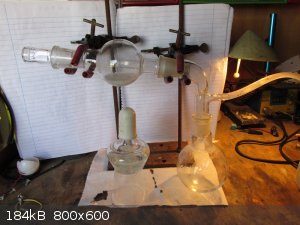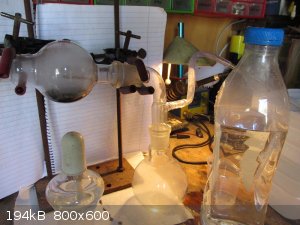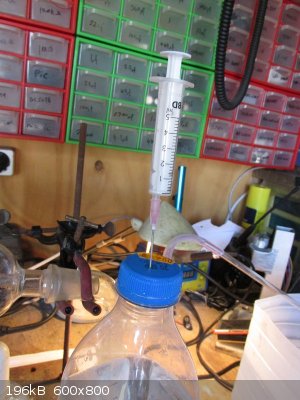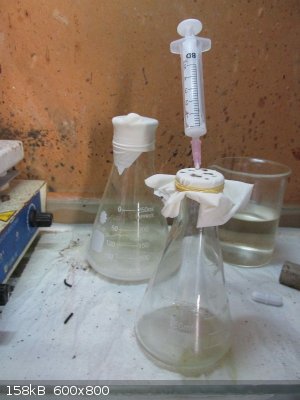aga
Forum Drunkard
    
Posts: 7030
Registered: 25-3-2014
Member Is Offline
|
|
Organic is too Advanced ?
For some reason i have held to the idea that Organic Chemistry is far too advanced for a novice like me, and that mastery of Inorganic Chemistry is a
requirement for OC.
Having recently spoken to a first year university student, they told me that it is not so, as they are studying both IOC and OC at the same time.
To date i've saponified, esterificated and would like to have a go at PET to Terepthalic acid as described in CHROMIUM's method referenced in the
"Chemistry of Terephthalic acid" thread.
Am i being too cautious and silly about OC or should i just make ethene from ethanol & sulphuric acid, dissolve the gas in water to make ethylene
glycol and basically just Do It ?
|
|
|
szuko03
Hazard to Others
  
Posts: 188
Registered: 3-4-2015
Location: USA
Member Is Offline
Mood: No Mood
|
|
Depends on how complicated you wanna go with it. At its most basic organic chemistry is like puzzle solving. It goes: to nitrate an alcohol one must
use what and under what conditions. If you look at it superficially like that then it can be really easy.
I always held kind of the opposite idea because of how analytic inorganic can get it is the harder of the two if you were to compare it. But again as
I am sure you know it depends on the level if you wanted to ascertain if a mixture is acidic based on whats in it, then inorganic can be easy then if
you wanted the PKa based on molar ratios or something its complicated.
Its been a while since i took either at a university level but thats how i always viewed it. So I think your fine to just do it, especially since you
have a decent stock of ethanol to start with 
Chemistry is a natural drive, not an interest.
|
|
|
Crowfjord
Hazard to Others
  
Posts: 390
Registered: 20-1-2013
Location: Pacific Northwest
Member Is Offline
Mood: Ever so slowly crystallizing...
|
|
Definitely. Go for it. There are many experiments in organic chemistry that are suitable for the somewhat-beginner that you are. It helps to know
stoichiometry, and the basics of chemical bonding of the various elements. If you get a basic organic chemistry book like those used for college
second year O-chem, you can probably read and learn as you do simple experiments like those you mentioned. There are also steam distillations and
liquid-liquid acd base extractions (eugenol from cloves is good), recrystallization, etc.
Also, hydrating ethene will just make ethanol again. Brominate it to 1,2-dibromoethane, then hydroxylate the bromines with base. Or something. :p. But
yes, please, do stuff! Organic stuff!
[Edited on 11-9-2015 by Crowfjord]
|
|
|
Little_Ghost_again
National Hazard
   
Posts: 985
Registered: 16-9-2014
Member Is Offline
Mood: Baffled
|
|
The word ORGANIC is probably to blame for the fear it strikes in people, surely most subconsciously view anything 'ORGANIC' as living and therefore
complex?
In a rational world OC should be easier as your dealing with a smaller subset of bonds etc, while inorganic chemistry deals with a much wider set of
elements? Ok major over simplification on my part but I try and stick to KISS.
In short all chemistry is difficult to grasp at the start, but OC has the added baggage of a name which adds a dimension of 'it's alive'.
Surely ultimately it boils down to one simple fact........... Chemistry is Chemistry, like a Doctor is a Doctor. Some specialist and get good in a
specific area while others are broader in the scope of knowledge but less detailed.
What I am saying is man has made soap for a good few years before he knew it was chemistry, so just sink a beer and do it.
[Edited on 11-9-2015 by Little_Ghost_again]
Dont ask me, I only know enough to be dangerous
|
|
|
aga
Forum Drunkard
    
Posts: 7030
Registered: 25-3-2014
Member Is Offline
|
|
I think i'd save a lot of broken glassware doing it sans biere.
Thanks for the insights peeps.
[Edited on 11-9-2015 by aga]
|
|
|
WGTR
National Hazard
   
Posts: 971
Registered: 29-9-2013
Location: Online
Member Is Offline
Mood: Outline
|
|
Not all experiments are organic, but they are set up in elegantly simple ways. I've done several of these experiments, and the reaction-in-a-syringe
method is quite simple and useful:
http://mattson.creighton.edu/Microscale_Gas_Chemistry.html
Your example with ethene to ethylene glycol is here:
http://mattson.creighton.edu/C2H4/index.html
Just do it man!
|
|
|
aga
Forum Drunkard
    
Posts: 7030
Registered: 25-3-2014
Member Is Offline
|
|
Brilliant stuff WGTR ! Many thanks for those links.
[Edited on 11-9-2015 by aga]
|
|
|
Little_Ghost_again
National Hazard
   
Posts: 985
Registered: 16-9-2014
Member Is Offline
Mood: Baffled
|
|
Aga has been kidnapped or swapped!
The real aga as we know has vessels welded up and loaded with truck fulls of deck chairs etc, he uses a 10 ltr bottle for silver experiments!
This 'syringe' type scale dosnt fit!!! And as for saving glass WFT????
The real aga makes his own in a bucket with beer farts. I declare impostor, and or a bad influence somewhere
Dont ask me, I only know enough to be dangerous
|
|
|
aga
Forum Drunkard
    
Posts: 7030
Registered: 25-3-2014
Member Is Offline
|
|
We are monitoring you. Yesss.
(smacks lips having devoured a live guinea-pig, then rolls one slitted eye in a reptilian fashion)
|
|
|
battoussai114
Hazard to Others
  
Posts: 235
Registered: 18-2-2015
Member Is Offline
Mood: Not bad.... Not bad.
|
|
Here we had Inorganic Chemistry first, but it was a simple 6 months course to get some basic concepts of inorganic (and some quantum, I think the
course was "General and Inorganic Chem") and then OC started. Some concepts like what orbitals are, electronegativity, pKa and stuff are required for
understanding some reaction mechanisms and why some products are favored in certain conditions. But overall our teacher would gloss over this stuff
when they're needed.
In case you're interested we studied the volume one of Solomons OC book. Now we're moving to the second book as the new semester starts. It's a pretty
good book I guess, every once in a while I'll go for a "second opinion" in those free OC books hosted by universities or in Youtube videos, but its
not frequent.
|
|
|
fluorescence
Hazard to Others
  
Posts: 285
Registered: 11-11-2013
Member Is Offline
Mood: So cold outside
|
|
Well I am an Inorganic Chemist, I just love inorganic chemistry but the stuff I do is pretty much learning everything by heart. At least I wouldn't
come up with the same solutions if I didn't look it up in literature. Organic Chemistry is easier in that case. My assisant in the lab once told me
that at the end of chemistry study I will know about 30 Name Reactions in organic chemistry. I guess we know even more by now after 3 Semesters of
organic chemistry. It seems hard but it depends on how well you are taught. I'd say from a certain basis which takes some time and needs really good
understanding in why it is happening like that you can pretty much come up with a good solution to nearly every problem. And inorganic chemistry tends
to use reaction mechanisms like OC for their stuff, too. It's not that diferent. If you spend some time you will hopefully understand where the
"weakpoints" of a molecule is and that's where you do most of the chemistry, say Carbonyl-Groups. There is whole semester lecture on the chemistry of
carbonyl groups and you can use that for so many other reactions if you just understand it. So OC is not that hard to learn, it takes some will, some
ethusiasm for the topic but it will probably be worth it. And I think for a young home chemist there is much more OC Stuff than IC Stuff to do just
because of all the possibilties.
What I just recomment is using different books or google for Scripts from Universities. OC Literature is really bad and there are so many errors in
there that you'll have to compare in order to understand it. If you like to I can give you a short summary we made after our first Semester in Organic
Chemistry ( 3rd Semester) which sums up all reactions we had, no explanation but it's a good summary of basic and advanced organic chemistry and the
stuff you should know.
[Edited on 12-9-2015 by fluorescence]
|
|
|
aga
Forum Drunkard
    
Posts: 7030
Registered: 25-3-2014
Member Is Offline
|
|
The funny thing is that the more i look at OC, the simpler it seems to be.
That's most likely because i don't understand it much, and Pictures are used a lot.
Not dead yet from IOC, so i guess OC is fair game.
Tally Ho !
First experiment is total alkylation of this goddam Lizard Alien that has posessed me for a week.
I'm pretty sure i can do OC Alcohol reactions with no bother.
Edit
Pathetic human. Ethanol is not new or amazing.
I pity you in your belief that you could affect me in any way.
You are as mere ants to us.
I like this mind. I will keep it.
[Edited on 12-9-2015 by aga Lizard Alien]
Edit
Up yours Lizard ! Have you met Mr Absinthe yet ?
Eat that !
[Edited on 12-9-2015 by aga]
Thish is nohing. Just blegh. I an u=in cuntolr. You doo a i sy.
[Edited on 12-9-2015 by aga Lizard Alien]
Feeling a bit woosy eh ?
[Edited on 12-9-2015 by aga]
Yu are inm contl. Stop. Stop nw.
[Edited on 12-9-2015 by aga Lizard Alien]
No way scumbag. Polish Vodka time. Assimilate that !
[Edited on 12-9-2015 by aga]
Rlease me. plse
[Edited on 12-9-2015 by aga Lizard Alien]
You know where the exit route is. Bye.
[Edited on 12-9-2015 by aga]
I'l be bak
[Edited on 12-9-2015 by aga Lizard Alien]
Not by that route. Be Gone.
One more hard squeeze. Squeeeeeeeze .. and there he goes.
Another Lizard Alien disposed of.
[Edited on 12-9-2015 by aga]
|
|
|
Little_Ghost_again
National Hazard
   
Posts: 985
Registered: 16-9-2014
Member Is Offline
Mood: Baffled
|
|
The morale of this tale? GET a decent fume hood  and stay away from things that
fume. and stay away from things that
fume.
Dont ask me, I only know enough to be dangerous
|
|
|
aga
Forum Drunkard
    
Posts: 7030
Registered: 25-3-2014
Member Is Offline
|
|
LG2.59 you have no idea how much these bastard Lizard Aliens are interfering.
That last one absorbed nearly a week's worth of alcohol !
Can you imagine the Sobriety caused by an Invasion ?
|
|
|
Little_Ghost_again
National Hazard
   
Posts: 985
Registered: 16-9-2014
Member Is Offline
Mood: Baffled
|
|
I had no idea they could grow THAT BIG!!   
Dont ask me, I only know enough to be dangerous
|
|
|
Darkstar
Hazard to Others
  
Posts: 279
Registered: 23-11-2014
Member Is Offline
Mood: Sleepy
|
|
So you're perfectly fine with trying to learn the total mindfuck that is quantum mechanics, but you're deathly afraid of a little organic chemistry?
Because when it comes to levels of complexity, QM blows OC completely out of the water. Seriously, if you can make even a tiny bit of sense of quantum
mechanics (which, from what I've seen in Blogfast's thread, you clearly can), you can make sense of damn near anything.
Honestly, dude, you've got to stop beating yourself up. If I had a dollar for every time I've seen you call yourself a drunken idiot or claim that you
know nothing of value or importance, I'd have...well, I'd have a lot of dollars. You may be a drunk, but you're certainly not a dumb drunk.
Dumb drunks don't hang around on science forums trying to better themselves by attempting to learn things like chemistry and physics.
So after looking back at your first few posts on SM, here's what I've gathered thus far:
- You're about 48 years old.
- You became interested in chemistry around the beginning of March 2014.
- Prior to last year, the last time you had studied chemistry was back when you were 16 years old. (I'm guessing in secondary school?)
So you've been into chemistry for all of, what, a year and a half now? And on top of that, you've been learning everything on your own? And on top of
that, you're doing all of this in your late 40s? If that's the case, I'd say that you're doing damn fine. Do you also have kids? Because if
you do, that's even more impressive. Either way, I think you're more or less right where you should be. Where I live, undergrads are usually required
to take two semesters of General Chemistry before taking Organic Chemistry, with General Chemistry I & II being virtually all inorganic. So unless
you take one of those courses during the summer, completing two semesters of General Chemistry normally takes about a year's time. And that's in an
academic setting where the student is taught personally by a professional chemist in courses that are structured to ensure that the material is
introduced in the most optimal order, not in the random, out-of-order way you tend to get when trying to learn it on your own.
Anyway, if you honestly feel that you're ready to make the jump to OC, I say do it and don't look back. On the other hand, if you feel that you may
need a little more time, then just take a little more time. Really, there's no reason to rush--you'll get there when you get there. But don't think
for one second that you need to master inorganic first, because that's completely untrue. Do you honestly think that all of these college kids are
mastering inorganic chemistry after just two semesters?
|
|
|
smaerd
International Hazard
    
Posts: 1262
Registered: 23-1-2010
Member Is Offline
Mood: hmm...
|
|
Quote: Originally posted by Darkstar  | ... when it comes to levels of complexity, QM blows OC completely out of the water. Seriously, if you can make even a tiny bit of sense of quantum
mechanics (which, from what I've seen in Blogfast's thread, you clearly can), you can make sense of damn near anything.
Honestly, dude, you've got to stop beating yourself up. ...
|
I will second both of those sentiments very strongly!
@Aga - Organic chemistry isn't hard. You will come to find a lot of people despise it because they never took the time to understand the underlying
principles and took a 'memorization' approach to their coursework. It can be seemingly non-linear when you are learning the rules/patterns but it is
not more difficult than anything else. I found it incredibly easy but I tend to think in pictures.
There is a sort of 'mathematics' to electron pushing, and some over-head with learning what structures are what and their basic reactivity. You can
learn it without any trouble infact there are some really good 'lectures'/study sessions on youtube that I highly recommend - https://www.youtube.com/watch?v=3UmglHJDijc
Really all you need for entry level Organic Chemistry is an understanding of VSEPR, lewis dot structures, a general understanding of pKa(acid/base
nature), and basic concepts of resonance structures(your understanding of resonance will increase with practice).
The experiments are pretty fun too. Pretty well suited to home experimentation as well as long as one is safe. If you go down this road, SciMad is a
tremendous resource to have at your finger tips. There are some organic chemistry wizards and serious experimental cowboys (in my opinion among the
best in the world) on this forum ready to answer any decently (even indecently) posed questions.
edit -
| Quote: | | To date i've saponified, esterificated... |
congratulations you've accomplished about ~3/5th of a typical organic chemistry lab course. Throw in a distillation(which you have done), some
chromatography and TLC, a recrystallization(which you have done), a separatory funnel separation(which I bet you have done), a 2-3 step synthesis and
you're there. Considering you built a melting point apparatus that surpasses the ones I used as an undergraduate from literally nothing I'd say you're
in good shape! You'd be surprised by how much you are learning informally by hanging out here Aga  . .
Once you learn organic chemistry then you can look at biochemistry! I found organic chemistry to help me understand some of the applied quantum
mechanics in physical chemistry as well.
[Edited on 13-9-2015 by smaerd]
|
|
|
aga
Forum Drunkard
    
Posts: 7030
Registered: 25-3-2014
Member Is Offline
|
|
Today was 'have a go at OC' day.
For laughs i though i'd see if i could make Ethylene Glycol.
Not having many OC reagents apart from ethanol  it went like this :- it went like this :-
Dehydration (!) of Ethanol by boiling it and passing over hot Al2O3 catalyst to give Ethene. Catch the gas in an inverted bottle
of water in a bucket.
http://www.chemguide.co.uk/organicprops/alkenes/making.html
React that with chlorine gas (HCl + TCCA) with FeCl3 as catalyst.
(chlorination ?)
Separate the 1,2-dichloroethane (aka ethylene dichloride) from the ferric chloride.
Reflux the 1,2-dichloroethane with dilute Na2CO3 to get ethylene glycol.
http://www.ucc.ie/academic/chem/dolchem/html/comp/glycol.htm...
(dunno what you'd call that reaction)
Is OC simply using a different sub-language to describe the reactions ?
I got the Ethene, but it would not react with the chlorine on this attempt.
|
|
|
aga
Forum Drunkard
    
Posts: 7030
Registered: 25-3-2014
Member Is Offline
|
|
If at first you don't succeed ... try the method WGTR posted.
Unfortunately i have no 60ml syringes, so used a 2 litre milk bottle instead (very optimistic !).
Once again the anti-bump head came in handy. Shame it's never been used to stop bumping ...
This time i mixed the gasses by transferring them to a clean dry conical flask with an improvised septum using a hypodermic syringe and incredibly
some liquid condensate has appeared on the glass. Very small quantity, but then very little gas was mixed.

  
|
|
|
smaerd
International Hazard
    
Posts: 1262
Registered: 23-1-2010
Member Is Offline
Mood: hmm...
|
|
Cool experiment there Aga
Yea, organic chemistry is a means of describing the structure and reactivity of carbon containing compounds.
|
|
|
subsecret
Hazard to Others
  
Posts: 424
Registered: 8-6-2013
Location: NW SC, USA
Member Is Offline
Mood: Human Sadness - Julian Casablancas & the Voidz
|
|
I think that organic is both easier and more rewarding for the amateur chemist; it's more about geometry that you DON'T have to calculate, eg crystal
structures in inorganic chemistry which can be obnoxious to learn. In terms of the personal reward, there's the knowledge of course, but organic
chemistry has pretty colors AND nice smells.
Fear is what you get when caution wasn't enough.
|
|
|
battoussai114
Hazard to Others
  
Posts: 235
Registered: 18-2-2015
Member Is Offline
Mood: Not bad.... Not bad.
|
|
Hey aga, from what I know (which is very little) these reactions involving gas phase cholrine really aren't particularly easy to perform. It has to do
with how unfavorable the step in wich a partial polarity difference is induced in the chlorine molecule is. The reactions tends to happen faster (or
maybe just actually happen) through the free radical pathway, but for this the gas would either need lots of heat to start the reaction, or be in
liquid phase and have something like a peroxide as starter.
Now these are assumptions based on Bromination reactions I've studied yesterday, so maybe I'm completely wrong....
|
|
|
Cou
National Hazard
   
Posts: 958
Registered: 16-5-2013
Member Is Offline
Mood: Mad Scientist
|
|
No, i'd say inorganic chemistry has the pretty colors but no smell,
while everything in organic chemistry is either a white powder or clear liquid, but makes up for that with the diversity of smells that might not even
exist in everyday life. And for the ones that DO exist in everyday life, it's wonderful to know exactly what molecule is causing what you are
currently smelling? Walk by a stinky dumpster that that smells like rancid cheese? Butanoic acid. The sickenly sweet smell of tar? Phenol
|
|
|
Biblos
Harmless

Posts: 2
Registered: 17-10-2015
Member Is Offline
Mood: No Mood
|
|
why no colors
Cou, I read your post and it made me think a bit. It's true most organics are colorless. That made me wonder why. It all starts with "why?" doesn't
it?.
After a bit of reading it's that all those C-C, C-N, C-O, N-O, C-H bonds don't absorb light in the viable spectrum. Pretty obvious once I read it but
I had to go look it up. I have forgotten so much and there is so much more I never learned in the first place 
Once, about 30 years ago I took an IR spectroscopy class and I can still remember that cool C=O peak... one of the only one's I could reliably read,
at around 1600nm up in the infrared. Probably no point of posting this but in case anyone else wondered I thought I'd share. Isn't Chemistry cool?
|
|
|
hissingnoise
International Hazard
    
Posts: 3940
Registered: 26-12-2002
Member Is Offline
Mood: Pulverulescent!
|
|
It should really be called "carbon chemistry" or better "carbochemistry", then inorganic chemistry could simply be "chemistry" without reference to
organs, a hangover from the old "vital force" mumbojumbo . . . ?
|
|
|